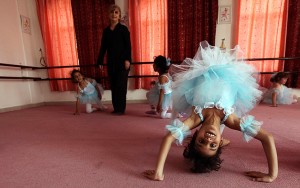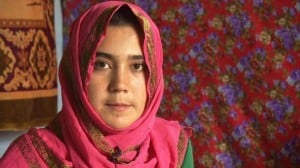Last week was International Women’s Day, and a lot of news items this week were related to this event. In Kazakhstan, this day is marked with Miss-competitions and a call by the president for classes to teach mothering skills. RFE/RL marks this day by featuring the stories of several working mothers, from countries like Tajikistan, Pakistan and Azerbaijan. Syrian refugee women in Lebanon share their stories and feelings connected to International Women’s Day. In Kyrgyzstan and Afghanistan, women (and men) went to the streets to demand gender equality. Women in Gaza reflect on their “abnormal” lives and the many obstacles they face and RNW profiles 9 Arab women of influence. March 8 was also the start day of new campaign to stop stoning and according to this article on openDemocracy, this issue is important to everyone.
The BBC shares the story of Iraqi Marwa, who was gravely injured in an air raid ten years ago at the age of twelve.
According to a report, Female Genital Mutilation is on the rise in the U.S., especially among migrant communities of African and Middle Eastern background.
In the Indian city of Hyderabad, the illegal bride bazaar where men come to “acquire” young Indian girls for short term, and often abuse-filled, marriages, is still thriving.

Nusreta Sivac has survived rape and witnessed murder and torture during the Bosnian war and her determination to bring the prepetrators to justice have helped to make rape a war crime.
Female artists in Tunisia say that they feel less free under the new regime and fear that their art will be subject to rules and regulations in the future.
A Muslim helpline in the UK has revealed the majority of the faith attacks in the country target Muslim women.
Without other options, some desperate female Syrian refugees turn to prostitution in an attempt to survive and support their families.
The Guardian speaks to Lul Ali Osman Barake, the Somali woman who was sentenced to a year in jail after being raped.
A Frenchman who ripped off a face veil from Muslim woman at a fairground in France, has been sentenced to a suspended prison sentence and is ordered to compensate the victim.
In Iran, more and more unwed couples are living together; conservative Islamic groups hope to reverse this trend.
Zinat Karzai, the wife of Afghan president Hamid Karzai, is sometimes referred to as Afghanistan’s invisible first lady, but an interview with the BBC sheds some light on her life and person.
In a country where the hijab was once a rare sight, Amra Babic, the Bosnian mayor in hijab, is challenging assumptions about Islam and (visible) Muslim women.
A Turkish trial project aims to set up a (breast)milk bank so that more newborns can drink breastmilk, even if the mother is unable to or has passed away. Islam forbids marriage between children who are fed milk from the same mother, and the project has met concerns in the country.
Egypt’s Muslim Brotherhood party slams the draft version of a UN document on violence against women, saying it is “deceitful.”
Since Al-Shabaab was driven out, the khat (or qat) has made a comeback in Somalia, where it provides an important means of income to the predominantly female khat sellers.
In order to avoid taxes, Moroccan traders employ “cargo women”, who carry up to 80 kilos of goods on their backs into the Spanish enclave of Melilla, in truly horrid circumstances.
Alcoholism is a huge problem in Uzbekistan, but according to Uzbekistan’s public television it is especially unbecoming for women to drink and women are, supposedly, more prone to become alcoholists compared to men.
Musicians and artists have rallied in Pakistan’s Khyber Pakhtunkhwa for more government protection for (female) singers and artists.
In Algeria, the police force is still considered to be more male career option, but some Algerian women say that they find joy in the challenge to be a policewoman.
Palestinian filmmaker Najah Awadallah made between 2008 and 2010 three documentary films about marginalized women in the Gaza strip.
Pakistani (Sunni) soldier has been stoned to death on orders by tribal elders in Kurram, for having a relationship with a local Shia woman.
A draft law in Afghanistan on women’s rights finds little support among Afghan MPs; some say it contradicts the Islamic Sharia law.














